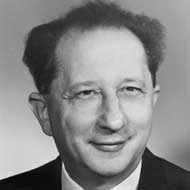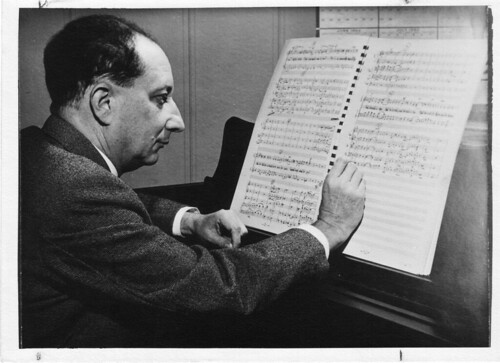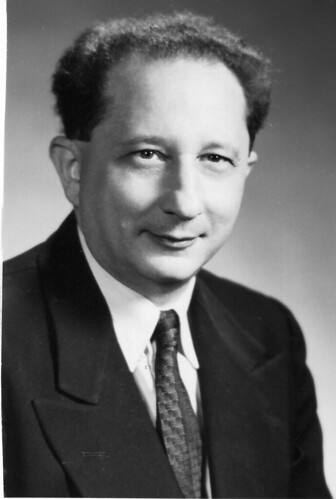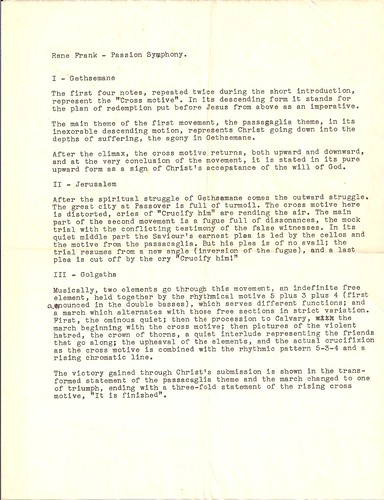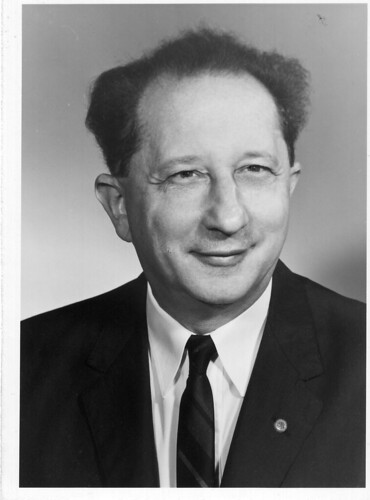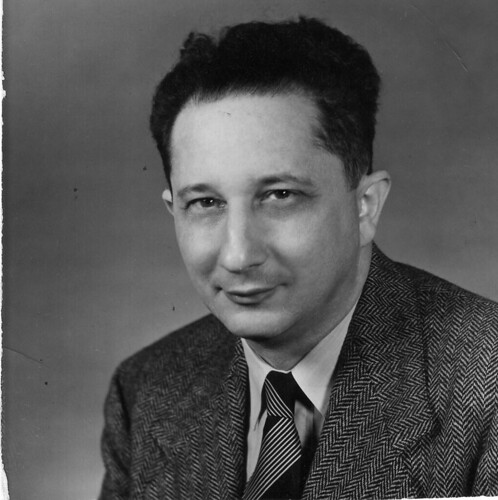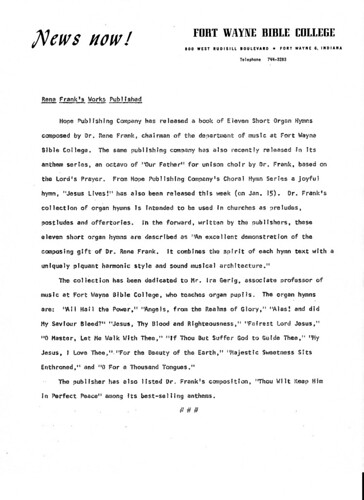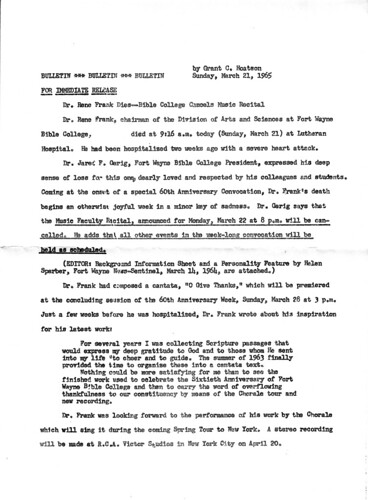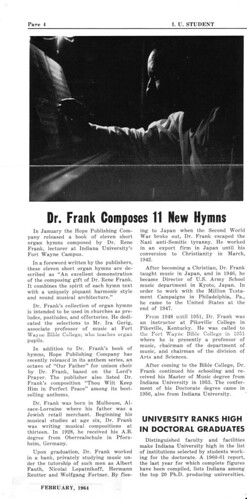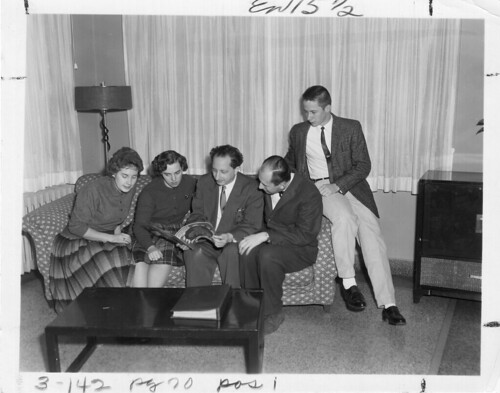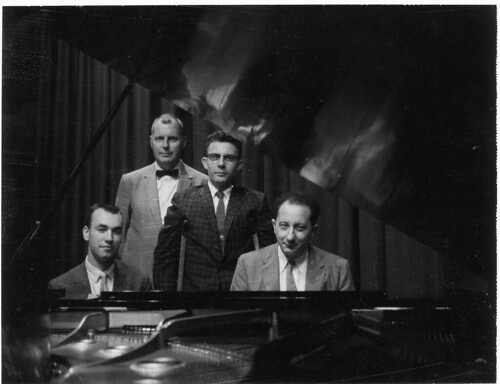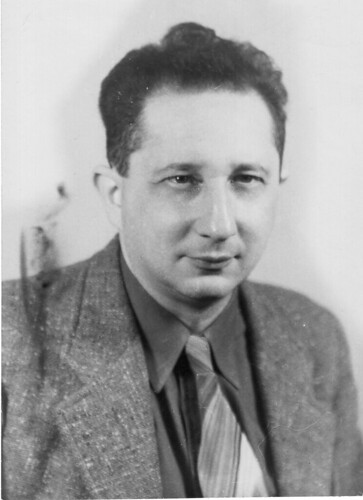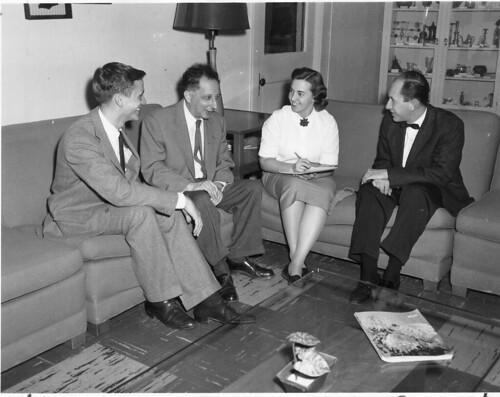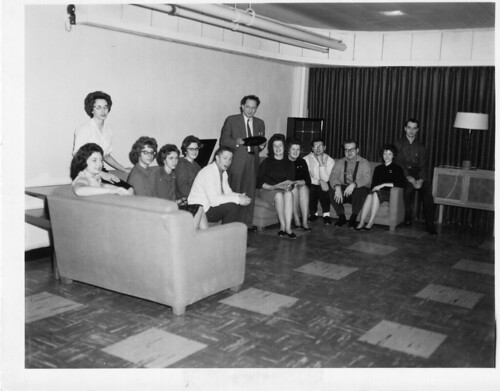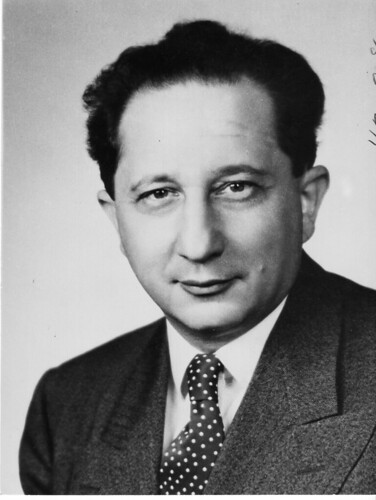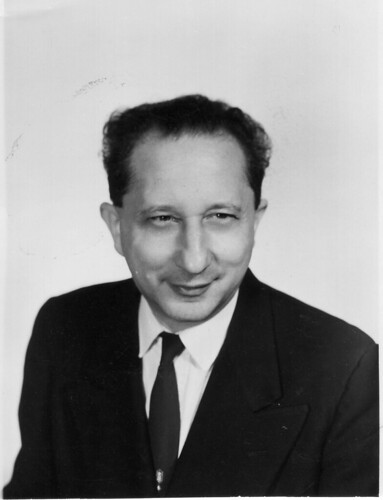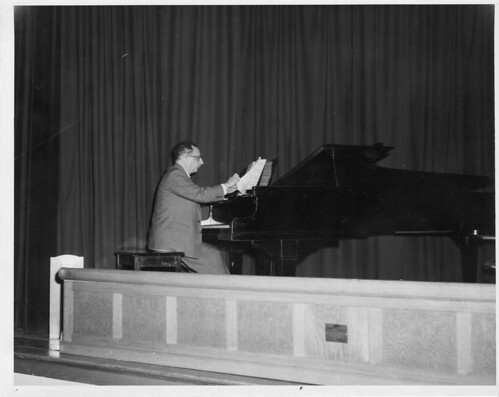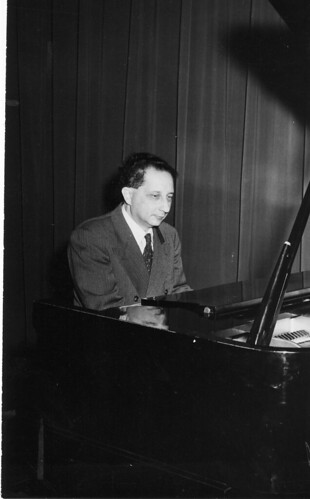R E N É F R A N K
1910-1965
By: Marlene Langosch Schleiffer g62, protégé, colleague and friend
Taken from a biography written in the summer of 1965
March 21, 1965, marked the homegoing of Dr. Rene Frank, long-time and beloved member of National Church Music Fellowship (NCMF). His one aim in life was to love and serve the Lord, and this he did through his compositions, his teaching, and his counsel with students and fellow musicians.
Rene Frank was born of Jewish parents in Alsace-Lorraine on February 16, 1910. He grew up in a musical atmosphere, for his mother was an accomplished pianist and singer. As a child, he willingly accepted the religion of his parents, but through the influence of his young friends and because of the half-heartedness of religious observance among his people, he came to doubt the Biblical account of creation and the reality of sin. He confessed later that in the midst of this weakened moral climate, the strongest force of purity in his young life was music. He began composing when he was 13. He was a pupil of Rudolph Fetsch in piano; of Nicolai Lopatnikoff, Herman Rautter, and Wolfgang Fortner in composition; and was a graduate of the Oberrealschule, Pforzheim, Germany. But after such encouraging beginnings, his musical work was interrupted and he was forced by the Nazi threat to leave Germany at the age of 25.
In 1936, therefore, René went to Yokohama, Japan, in the employ of a Swiss export firm with whom he remained until after his conversion in 1942. There were many Germans in Japan at the time, including members of the Gestapo who were sent there to persecute the Jews. In the providence of God, Rene escaped their brutality, but was seldom free from the fear of them.
Meantime, Rene's fiancée had come to Japan where they were married in 1937. Marriage with a Gentile had been forbidden by the Nazis while they were still in Germany, but in Japan his wife was a source of comfort and help to him. It was through her conversion and the influence of Christian missionaries in Yokohama and elsewhere that René was led to think seriously about the claims of Christ. When Louise attended church services after her conversion, he could not stand seeing her go without him, so he went along.
Finally, on March 15, 1942, he was brought to the Lord through a strange incident which he described in this way:
That night before retiring in my usual manner, I hung my suit on a door, the upper half of which was glass. During the night I was awakened suddenly and noticed that the moon was shining through the glass on my garments outlined a dark cross. Just then that shameful word “Tole” (Hanged One) used by my dear grandmother for Christ came to my mind. A burning shame swept over me at the thought of our (the Jews) rejection of Him about whom I had by now heard so many touching and wonderful things. At that moment for the first time in my life, I felt the presence of God. And many times since that strange incident, I have marveled [sic] why it was that only that outline of the cross broke down the wall of separation and doubt between God and me.
For three days following this experience, Rene was in great agony of soul because he now saw himself as God saw him, full of vanity and hypocrisy. He was driven to the Scriptures to seek God's will, and when peace came, it was complete.
Rene's new-found faith led him to leave the export business and to begin life again as a full-time musician. The couple moved to Kobe where they rented a home and he began teaching piano. Then the war came. Rene's passport was taken from him and the Franks became people without a country -- kokuseki nashi, as the Japanese say. The Japanese no longer mixed with foreigners, and the news blackout made outside contact virtually impossible and kept everyone in the dark -- almost literally so -- about the progress of the war. It was during the very last air raid that their home was destroyed, but they started again and were soon established in a hillside house in Kobe. During 1946-47 Rene commuted twice a week to teach at the music school for GI's in Kyoto, and on March 11, 1947, a fire again completely destroyed their home, the origin of which forever remained a mystery. Lost was the orchestra score to the "Five Psalms", the work of many weeks, which Rene mourned more than all the clothing and music books burned in the fire.
But catastrophe also brought its blessing. The day before the fire a German Bible had come from the United States. After a restless sleep at a friend's home the night of the fire, Rene opened the Book and his eyes fell on Psalm 40 from which he derived much comfort and assurance. This psalm was to become his life Scripture portion. The second verse confirmed the Franks in their resolve to go to the United States as soon as possible to establish a new 1 ife there. It so happened that they were among the first to receive visas, in spite of what seemed to them impossible odds. Verse three stood out to them as peculiarly their own. Rene often quoted these verses in his testimonies at Fort Wayne Bible College, each time with a glow of joy and assurance.
Rummaging among the ruins of the fire two days later, the Franks came upon a half-burned copy of the vocal score of the "Five Psalms" -- a further comforting sign. But this was not all. During the air raid that had taken their first home, René had entrusted his composition to a Japanese pupil for safe-keeping. Since they had never been returned, René thought them lost; but now suddenly the pupil returned with them. Rene said later:
Among the manuscripts so wonderfully recovered, I found several interesting pieces, which quite naturally arranged themselves into a pattern that would illustrate to the music lover the new life in Christ. The whole series I compiled in one unite which I called 'Panorama of Hell and Heaven'.
Thus did sorrow and grief yield joy and peace, and the chaos of doubt became a quiet certainty.
On Thanksgiving Day, 1947, the Franks arrived in San Francisco. From there Mrs. Frank took a plane to Philadelphia where they were to stay in the home of a missionary they had known at Nino Oka, a health resort at the foot of Fuji-ama. Rene followed by train with the few belongings left to them. They remained in Philadelphia until the Spring of 1948 at which time Rene took a position as instructor of music at Pikeville College in Kentucky.
In the fall of 1951, the Franks moved to Fort Wayne and immediately René set to work at Indiana University to obtain his graduate degrees, earning his M. Mus. in 1953, and his D. Mus. in 1956. For his doctoral study, René composed the Passion Symphony, a work which he always considered his masterpiece, for into it he poured himself without stint. Some things came to him without seeming effort, but this work required much toll.
Concerning his music, Dr. Frank's major professor at Indiana University wrote:
The greatest stylistic influence in his own work was certainly Hindemith, and more specifically the Hindemith of the Gebrauchsmusik period; he found himself a simple and direct mode of expression, technically not very complicated, clean and unpretentious.
René liked contemporary dissonant music, but felt that this element was only temporary, so curbed its use in his own composition. He could not abide atonality and the electronic productions of such composers as Stockhausen, for to him this music was symbolic and even symptomatic of the unresolved confusion of mind and spirit in the present age. This same feeling carried over into the field of art of which he also was fond.
For many years after coming to Fort Wayne, Dr. and Mrs. Frank spent part of their summers in Wisconsin to escape the hay fever season, during which Rene suffered greatly. There he came to know Dr. Thor Johnson, Director of the Interlochen Arts Academy, who pays him this tribute:
From our initial acquaintance several years ago, I was immediately impressed with the great beauty of his personal mission in life. It was always apparent [sic] that he knew that he was cal led to be a servant of our Lord. I always felt better after having been in his presence.
Dr. William Ballard of Northwestern University said of him:
As a person, Rene always proved himself affable, thoughtful, generous, appreciative, warm, approachable, kindly, concerned for the welfare of others, communicative–in brief, simpatico, to use an Italian adjective for which there seems to be no easy English equivalent.
Dr. Bernhard Heiden of Indiana University, who was René's major professor, also remarked:
Rene was a truly modest person, and I believe his music reflects this quality." Along this vein, this writer for one will never forget how he insisted from the beginning of our acquaintance that address him as "Rene" -- none of this "Dr. Frank" stuff!
In the Fort Wayne area, Rene was an active member and participant in the Performers Workshop, where his chamber and solo works were played and respected by the leading musicians of the community. I had the privilege of attending the premiere of his Christmas oratorio, And God Came, performed by the Indiana Central College Choir in Indianapolis in the fall of 1960, and of conducting its first performance the next year in Fort Wayne with the assistance of some members of the Fort Wayne Philharmonic Orchestra. This orchestra, in 1959, under the direction of its conductor, Igor Buketoff, performed the Passion Symphony, and in 1962 the song cycle for baritone and orchestra, Triptych of Heavenly Love, sung by a Fort Wayne musician friend, Mr. Henry Simminger.
One of the orchestra members with whom Rene had much in common as a musician, said of him:
He taught me that the tongue blessing God without the heart is but a tinkling cymbal; the heart blessing God without the tongue is sweet but still music; both in concert make their harmony, which fills and delights heaven and earth. With the passing of his body, part of me died also, but his spirit will live on and from this I can get strength to know and reason what really is one's purpose on earth.
It has been my privilege to know and work with Dr. Frank as colleague and friend for the last four years. During that time I saw many sides of his character, both his weaknesses and his strengths. He was a man of strong conviction (born and bred in him in Germany), and wholly loveable. It was the man -- the Christian man -- that made the musician: the man transformed, inspired, and infused with a burning desire to please God. This he did in his professional contacts in the Fort Wayne area and elsewhere: in his work as teacher and administrator, and in his earnest longing to see his Jewish friends and relatives won to the Savior.
I first met Rene Frank when the National Church Music Fellowship held its convention in Fort Wayne in 1956. I was impressed by his almost fatherly kindliness and deep devotion to God. As I listened to his organ preludes being performed, I knew that here was a dedicated Christian musician with skill and originality in composition. I was eager to perform at least a portion of the "Triptych", which I did subsequently, and also heard the performance of his Violin Sonata, op. 35, and the Variations on "O Come, O Come, Emmanuel," for violin and piano. Members of N.C.M.F. also have performed a number of his works including the more recent male chorus, Warfare and Victory, op. 46.
If anyone word could be used to describe Dr. Frank's influence on those of us who knew him best and on people wherever he went, it would be the word, "inspiration". The Spirit of God filled him, and his music had an inspired quality impossible under any other circumstances. I think Harold Best of Nyack expressed it most aptly when he said:
“Rene was first of all a worshipping Christian whose deep love for Christ had made it impossible for his music to come first. What he composed was therefore and always a result of his experiences in the things of God •.. Rene created out of a deep, undisturbed, wholly committed 1 ife of worship and adoration ... He learned, perhaps better than most, that mere technical display and aesthetic profundity, while necessarily present in the greatest music, must often be set aside for an elemental simplicity; of the Work: easy to way hard to explain. gift only as he grew and more skillful as a simplicity akin to the simplicity grasp, but fresh and pregnant in a He seemed to have been given this humble in his experience with Christ a composer.
Rene was thus a man who reduced praise to its keenest essence without falling into the lush trap of pseudo-simplicity which has ensnared so many who speak of simplicity without knowing that it is a cheapness and immediacy which have beguiled them. His simple music had all the raw materials of his complicated music and was thereby elemental rather than elementary. One could always envision the large in the small and the complicated in the simple; one could recognize that each proceeded out of a single, and undeviating core of integrity, mellowed by years of musical discipline and softened by the unction of the Holy Ghost, Whose help, to be sure, was invoked at each turn of phrase and choice of text .
Rene was a personal inspiration to me. In other words, the things that I have said above concerning Rene are things that I must do, and must surrender to, and I know that largely because I have known Rene.”
Though I have sought to do so in this article, I have been unable to separate the man from his music, for the two seem inseparable. A few further comments about Rene's music by musicians who knew him should be made here, however:
"The greatest characteristic of Rene's music is its virility. His music always seemed to move with a firm sense of musical line. He wrote what he felt and what he knew, and that was large indeed. In his sacred music, for example, the "Five Psalms" or the "Six Hymn Preludes" and numerous anthems, he was always able to infuse a kind of masculine strength which distinguished his music as vastly superior to most of the run-of-the-mill sacred music published today."
--Frederick Jackisch
Wittenberg University
"As a composer he was a man of imagination and insight, founded upon tradition, yet able to reach into uncharted waters with security and success. His thinking was infallibly instrumental, though he recognized the capacity of the human voice and restricted his compositions for voices to the capacity of that instrument. His harmonic idiom was logical and within grasp of singers, which is not always true of even the most widely recognized contemporary composers.
--William Ballard
Northwestern University
As in the case of so many composers just coming into their own, Dr. Frank experiences many disappointment in seeking to have his music performed. Only in the last few years of his life did he receive any encouragement concerning his music and acceptance. A few compositions and collections have been published, but most remain yet in manuscript. Through the kindness of a friend, copies of many of these manuscripts were bound and placed in the college library in 1964. Most of his compositions written prior to his conversion were lost.
Editor’s note: the following listing has replaced the one originally included in this biography, and is compiled from the collection of his music housed in the Fort Wayne Alumni Archive. The bound copies referred to are also in the Archive.
|
Opus Title |
Opus & # |
Date |
Medium |
|
Sonata in G for Piano solo |
1 |
1938? |
Piano |
|
Autumn. 9 little piano pieces |
2 |
1943 |
Piano |
|
Five Psalms for High Voice and Piano or Orchestra |
3 |
1946-53 |
High Voice |
|
Appeal to America |
4 |
1946 |
Two Piano, four hands |
|
Dance suite for piano solo |
5 |
1946 |
Piano |
|
Sonata for violin and piano |
6 |
1946 |
Violin and Piano |
|
Two Oriental Poems for high voice and piano |
7 |
1946 |
Medium Voice |
|
Three Spiritual Songs on words by William Blake for medium voice and piano |
8 |
1947 |
Medium voice |
|
Panorama of Hell and Heaven |
9 |
1947 |
Instrumental Chamber (flute, oboe, clarinet, trumpet, and strings) |
|
Ten Hymns on words by Claude Heileman |
10 |
1947 |
SATB |
|
The Prodigal Son |
11 |
1947-48 |
solo, chorus, organ |
|
Japanese Bible Songs |
12 |
1947 |
|
|
The Hundredth Psalm |
13a |
1947 |
SAB with piano and organ |
|
Sonata for Violin and Viola |
14 |
1949 |
|
|
The Spite of Michal |
15 |
1948 |
SSA, soprano and baritone soli and piano |
|
Three Songs from the Slums ( Kagawa ) |
15b |
1948 |
Medium Voice |
|
Salomo’s Judgment |
16 |
1949 |
Baritone solo, SSA, and piano |
|
Songs to Sing to Your Children (Stevenson) |
17 |
1950 |
High Voice |
|
What is Man? |
18 |
1951 |
SATB |
|
Evening Prayer |
18b |
1951 |
SATB |
|
Missionary Psalm |
18e |
1951 |
SATB |
|
Love Divine |
18d |
1957 |
SATB |
|
Prelude, Pastorale and Cortege for organ |
19 |
1951 |
organ |
|
The New Birth |
20 |
1951 |
Medium Voice |
|
Hymns of the Cross. Fantasy for piano solo |
21 |
1951 |
piano |
|
Two Christmas Meditations |
|
1951 |
|
|
Whither, Wise Man? |
22 |
1951 |
SATB |
|
Two male choruses |
23 |
|
Male chorus |
|
Message for Today |
|
1952 |
(Isa. 40) |
|
To all Joshuas |
23 |
1952 |
male voices |
|
Call of Gideon |
24 |
1952-53 |
opera in one act |
|
O Worship the King |
25 |
1952? |
SATB, instruments (trumpet, violin, cello) and congregation |
|
Variations on French Melody for string quartet |
26 |
1953 |
String quartet |
|
Prelude and Fugue on “Jesu, meine Freude” |
27 |
1952-53 |
organ |
|
Pilgrim Variations for orchestra |
28 |
1953 |
orchestra |
|
Little Suite for flute, viola, and harp |
29 |
1953 |
"chamber, trio" |
|
Parable of the Virgins |
30 |
1953 |
SSA chorus, with piano or organ |
|
Sonata for Violoncello |
31 |
1953 |
violincello |
|
One Day: Twelve little piano pieces for Grade III |
32 |
1953 |
piano |
|
Sonatina for Piano |
33 |
1954 |
piano |
|
Psalm of Praise and Judgment (Psa. 96) |
34 |
1954 |
SATB |
|
Solos for trumpet and trombone |
35 |
1954 |
trumpet, trombone |
|
Andante Cantabile for string orchestra |
35a |
1954 |
orchestra |
|
Six Hymn Preludes for organ |
36 |
1955 |
organ |
|
String Quartet in E major |
37 |
1955-58 |
String quartet |
|
Passion Symphony for Orchestra |
38 |
1955-56 |
orchestra |
|
Music for Brass Instruments |
39 |
1955 |
Brass Ensemble |
|
Magnificat, for high voice and piano |
40 |
1955 |
High Voice and piano |
|
The Crucifixion (Whittier) |
40a |
1956 |
low voice |
|
Divertimento for Chamber Orchestra |
41 |
1956-62 |
orchestra, chamber |
|
Six Pieces for First Grade Pianists |
42 |
1957 |
Piano |
|
Summer Day: Seven piano pieces for a purpose, for Grade 1 |
42a |
1957 |
Piano |
|
Christ Comes in Majesty |
42c |
1957 |
SATB |
|
Song of Brotherly Love (Psalm 138) |
|
1957 |
|
|
Triptych of Heavenly Love |
43a |
1957 |
|
|
And God Came |
44 |
1958-59 |
soloists, mixed chorus, orchestra or piano |
|
Hymn Variations for Piano |
45 |
1960? |
Piano |
|
Warfare and Victory |
46 |
1961 |
male voices |
|
The Narrow Way |
48 |
1962 |
Medium Voice |
|
Eleven Short Organ Hymns |
49 |
1962 |
organ |
|
Trumpet Trios, for three trumpets and piano |
49a |
1962 |
trumpet |
|
Piano Hymn Classics II |
50 |
1963 |
Piano |
|
Song of Assurance |
51 |
1963 |
SATB |
|
O Give Thanks |
52 |
1963 |
SATB |
|
Trio for flute, clarinet, and bassoon |
53 |
1963 |
chamber, trio |
|
Emmanuel |
54 |
1964 |
SATB |
|
Bible Miniatures for Piano |
55 |
1964 |
Piano |
|
Hymn Variations for Trumpet |
56 |
1964 |
trumpet |
|
Duo for two violins |
57 |
1964 |
violin duet |
|
Japanese Children Sing, for violin and piano |
|
1942 |
violin and piano |
|
A Child's Hall of Fame. SA, with overture for piano |
|
n.d. |
SA |
|
Variations on “O come, O come, Emmanuel'' for violin and piano |
58 |
1954 |
violin |
|
Variations on ""We Three Kings"" for violin & piano |
59 |
1956 |
violin and piano |
|
Japanisshe Jahreszeiten |
|
1946 |
SATB |
|
Prayer in Memory of My Mothem, for flute, (violin) and piano |
|
1940 |
flute and piano |
|
Little David. Eight simple pieces for piano |
|
n.d. |
piano |
|
From whence cometh my help? (Psalm 121) |
|
|
SSA |
|
Thy Word. |
|
n.d. |
SATB |
|
II Timothy 2:15 (Chorus) |
|
n.d. |
Chorus |
|
Fear Thou Not. |
|
1961 |
SATB |
|
Suite for Four Clarinets |
|
|
|
Selected works have been transcribed into music print and are available by going to the the Alumni Center online store Some of his works available from the online Store (click). Inquiries regarding all of Dr. Frank’s music can be made by contacting the Fort Wayne Alumni Center.


